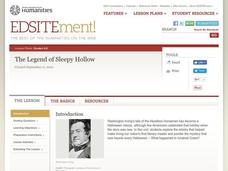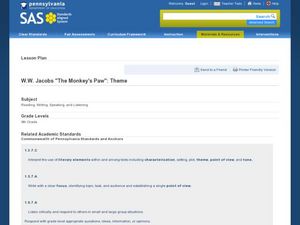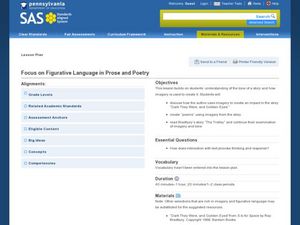Curated OER
Kumeyaay Indians
Useful for literary analysis, citing textual evidence, or summary skills, this lesson about the Kumeyaay Indians would be a good addition to your language arts class. Middle schoolers read novels and summarize the literature in their own...
English Linx
Textual Evidence Worksheet
Perfect for a unit on characterization and simple enough to use with any text. Your class will practice the Common Core standard of citing textual evidence to support their analysis by first making an assertion about a character from a...
K12 Reader
"How Do I Love Thee?" Supporting Ideas
Show your class what poem the famous line "How do I love thee? Let me count the ways" comes from. Class members read Elizabeth Barrett Browning's poem and respond to one question with a short paragraph. The question asks learners to use...
Polk Bros Foundation
Common Core Constructed Response Organizer
Get your writers ready to compose a constructed response essay in response to either an informational or fictional text. Pupils note down the big idea they wish to address as well as up to nine examples from the text that they wish to...
Polk Bros Foundation
I Can Identify/Infer Motive
Why do people and characters act as they do? Require your class figure out the motivation of two people or characters they read about in a given text. In the short charts, pupils note down who, what they do, and why they do it. After...
Polk Bros Foundation
I Can Sequence Important Events
After reading any short informational or fictional text, ask your class to analyze the important events. They note down three important events on a short timeline, describing the events with either words or drawings. After this, pupils...
EngageNY
Close Reading: Louie’s Change of Heart
Scholars read additional pages in Unbroken to discover more about Louie's character. Readers use turn-and-talk strategies to discuss character traits that describe Louie. They then answer text-dependent questions and cite evidence to...
Novelinks
Touching Spirit Bear: Anticipatory Guide
Will Peter and Cole ever forgive one another? Anticipation guides contain questions such as this to help teach readers how to make predictions about a text. First out of a series of five resources, the guide is full of statements about...
Prestwick House
Vocabulary in Context: Inside the World of Wizards
Enter the world of Harry Potter and learn new vocabulary at the same time. A high-interest reading passage provides insight into the history of Harry Potter. Follow-up activities incorporate key vocabulary strategies, such as using...
Curated OER
Anne Frank: One of Hundreds of Thousands
Students conduct research to put Anne Frank's diary into historical context. They use maps, timelines, essays and websites to examine the early victories of the German army, paying special attention to the Netherlands and experiences of...
Curated OER
Phineas Gage: Questioning Strategy
Focus on chapter two of Phineas Gage: A Gruesome but True Story About Brain Science with a questioning activity. After teaching and modeling several types of questions, learners work with partners and then independently to answer and...
Curated OER
Analyzing Literary Devices
Eighth graders identify figurative language and poetry in this literary analysis lesson. Using Through the Looking Glass by Lewis Carroll and a YouTube video for "The Walrus and the Carpenter," young readers complete a literary device...
Curated OER
The Legend of Sleepy Hollow
Explore Washington Irving's "The Legend of Sleepy Hollow" in this literature analysis instructional activity. Middle schoolers read and summarize the plot of the story. They then adapt passages for a contemporary audience and analyze the...
Polk Bros Foundation
I Can Infer Predictions Based on an Analysis of Motive
Use a character or person's motivation as the basis for a prediction of that character or person's next action. Pupils select an individual from their reading, copy a quote, write down an inference about that character's motives, and...
Curated OER
Phineas Gage: “This I Believe” Venn Diagrams After Reading Strategy
Difficulties with brain injuries still continue today. After reading Phineas Gage: A Gruesome but True Story About Brain Science, class members read a series of modern personal essays about brain injuries and choose an essay to compare...
Polk Bros Foundation
I Can Compare and Contrast
Work with your class to fill out this Venn diagram. Pupils can compare and contrast any two things and then write a short paragraph about the relationship demonstrated in their diagram.
Polk Bros Foundation
I Can Locate and Classify Information About a Topic
After reading a text, ask your pupils to recall and organize what they've just learned into a blank three-column chart. Class members write the topic and fill in the columns with information. The sheet also prompts students to write a...
Curated OER
W.W. Jacob's "The Monkey's Paw" Theme
Students identify the theme of "The Monkey's Paw" and relate it to prior knowledge. In this "The Monkey's Paw" lesson, students discuss fate and coincidence and debate which one controls destiny. A test is chosen as the winner based on...
Curated OER
Focus on Figurative Language in Prose and Poetry
Young scholars place emphasis on the use of figurative language when analyzing prose and poetry. In this figurative language activity, students explore the tone of a story and its imagery. Young scholars read and discuss how the author...




















